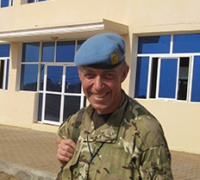
How to create and sustain cultural change – notes from the Olympic hosts
As Paris gets ready for this summer’s Olympic Games, we consider what the French organizers can teach businesses about embedding and maintaining cultural change ...

by Francesca Giulia Mereu, Stephen Kilpatrick Published 19 April 2024 in Leadership • 6 min read
High-stakes conversations encompass a wide variety of interactions, from interpersonal office conflicts to formal negotiations between organizations. While a tense exchange between rival co-workers doesn’t have the same gravity as negotiating a wartime ceasefire, a simple disagreement can have a lasting impact on keeping the peace between individuals, groups, and even entire communities.
Perhaps the highest-stakes conversations take place in times of armed conflict. Discussions over security, the safe passage of civilians and the wounded, ceasefires, and the release of hostages and detainees – typically made with incomplete data – are routine. This is the reason experience gained in the military sector can provide a unique context from which executives can learn and transfer these strategic approaches to important business dealings.
Achieving a state of complete trust in high-stakes or tense situations is naive and likely unattainable. But trust can be created by implementing these three – often underestimated – “bricks” of respect, openness, and commitment. Leaders should focus on specific actions that convey these qualities to build trust from the ground up.
The journey toward trust between adversaries often begins with respect. Making mutual respect a priority is important, especially in situations marked by past disagreements. In military terms, it means sights can be set lower with more confidence in hitting the target.
Military officers, no matter how tense the relationship with adversaries, see it as fundamental to address counterparts using their titles or ranks and acknowledging their training or experience. The same goes in the business world; referring to counterparts by their preferred title, honorific, or pronoun shows respect.
Stephen: “I was once tasked to provide mentoring support to an Iraqi general commanding a military force in combat. Noting my relatively junior rank of colonel, he was clearly unimpressed by the apparent disrespect this conveyed to him. Our relationship was always awkward and, for both of us, a struggle.
I applied this lesson in a later encounter. I showed an Iranian general close to senior leaders in Tehran a photograph of me in uniform alongside a British general. This confirmed I had the access to senior officers that I claimed to have. Upon viewing the photograph, the general nodded in approval and I sensed the atmosphere in the room change.”
Giulia: “What is trust built on? Respect. Showing respect again and again throughout the conversation is a way to reinforce the message of willingness and belief that a common agreement can be reached. Imagine a CEO has some tough negotiating to do with his company’s top suppliers. Approaching the conversation with a win-win strategy instead of a win-lose strategy can make all the difference. By acknowledging a competing entity’s right to success, a leader shows their respect.”

“Respect, openness, and commitment can transform trust from an abstract concept to a series of deliberate actions that pave the way to successful outcomes in high-stakes endeavors.”
Clearly and explicitly stating a willingness to connect and come to some form of agreement is primary. Being open about one’s background and showing interest in adversaries’ well-being can often help to demonstrate that the exchanges will be conducted in a collaborative and considerate manner.
These small acts are often overlooked yet help to lay the groundwork for reciprocal trust. Several simple behaviors can also help contribute to fostering openness. Proper use of body language and techniques such as summarizing what you’ve heard before answering are useful strategies.
Stephen: “In the biting wind in Bosnia, my patrol escorted a forensic team tasked to visit sensitive sites and record evidence of alleged war crimes. I offered the police officer who was monitoring and reporting our activities a mug of hot cocoa, which I had made myself at great effort, to demonstrate that I saw him as a key player in our joint venture. Whilst his surprise was tangible, it visibly reduced the tension and opened doors that had been firmly shut.”
Giulia: “When we engage in a high-stakes conversation, it can be tempting to establish authority and show strength. Even if it might seem counterintuitive, open body language and a friendly voice are more conducive to reaching a common agreement. They are not synonyms of weakness, agreement, or trying to become “pals.” In practice, this could be as simple as looking your staff in the eyes when communicating difficult information like an important organizational change. This shows you care about their reaction and feelings.”
Being open about one’s background and showing interest in adversaries’ well-being can often help to demonstrate that the exchanges will be conducted in a collaborative and considerate manner.
There will be times when a direct and even forceful approach is necessary. In these cases, it is important to balance assertiveness with visible signs of openness alongside a firm demonstration of respect.
A clear indication of professionalism is pivotal: punctuality, comprehensive briefing, and preparation will instill confidence even in the face of internal apprehension. It becomes a tangible manifestation of reliability and competence, proof of the commitment needed by both parties.
While military forces are noted for their punctuality and attention to detail, in the world of business, these signs could be equally beneficial to create a more conducive climate when the situation is tense and the outcomes important.
Stephen: “In a heated exchange with an officer over the conduct of dangerous night patrols in South Sudan, I vividly recall that he suddenly turned my spectacles upwards on the table so that the lenses would not get scratched. With that simple act of thoughtfulness, he demonstrated through this attention to this small detail, that he too was invested in the engagement – without my spectacles, I would have been unable to continue in a professional manner. I felt I could trust him to respect my position and proceed with our difficult discussion.”
Giulia: “In the business world, the importance of showing up – from the very start – as considerate, polite, and professional cannot be underestimated. An executive should come to any high-stakes conversations promptly and well-prepared. While the details of many meetings are out of our control, proper preparation will show they take the meeting seriously.”

“In high-stakes business conversations, coming prepared and showing consideration from the start is crucial. Proper preparation signals seriousness about the meeting.”
During high-stakes conversations, trust is the catalyst for constructive engagement and finding positive resolutions. By applying lessons learned from the military sector to their business affairs, executives can adopt actionable strategies that reap tangible rewards, both large and small. Respect, openness, and commitment can transform trust from an abstract concept to a series of deliberate actions that pave the way to successful outcomes in high-stakes endeavors.

Executive coach
An executive coach with more than 20 years’ experience, Francesca Giulia Mereu is also author of the book Recharge Your Batteries. She regularly works with Frontline Humanitarian Negotiators (CCHN) and at IMD with senior leaders of global organizations. You can follow her LinkedIn Group on managing your energy here.

Former British infantry officer
Stephen Kilpatrick is a former British infantry officer who saw operational service on multiple tours to Northern Ireland, the Balkans, the Middle East, and Africa. He also completed two tours as an instructor at the UK’s military leadership academy at Sandhurst. He now works in the humanitarian field with a focus on reducing civilian harm resulting from military operations.

8 hours ago • by Lindsay Sarah Krasnoff in Management
As Paris gets ready for this summer’s Olympic Games, we consider what the French organizers can teach businesses about embedding and maintaining cultural change ...

26 June 2024 • by Michael Yaziji in Management
Understanding your organizational capacity for agility and responding to events accordingly is the key to success in the new business environment, says Michael Yaziji....

21 May 2024 • by Magdi Batato, Xavier Mesnard, Suketu Gandhi in Management
Operations management built on a foundation of trust, talent, transparency, and technology can help companies not only react to but anticipate future disruptions. ...

17 May 2024 • by Michael D. Watkins in Management
Are you struggling to lead successfully in the face of relentless disruption and uncertainty? There has never been a better time to master the art of strategic thinking....
 Audio available
Audio availableExplore first person business intelligence from top minds curated for a global executive audience